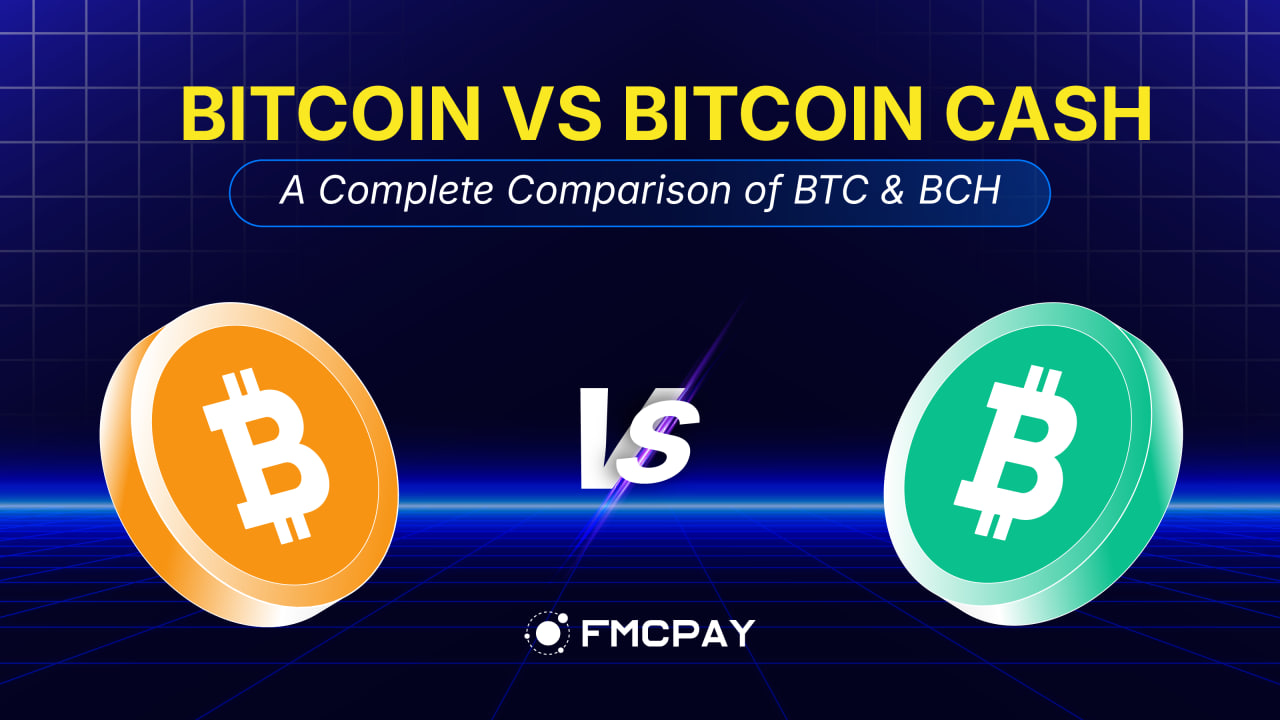Bitcoin and Bitcoin Cash are two of the most well-known cryptocurrencies, both originating from the same blockchain but evolving into distinct digital assets with different use cases. Bitcoin vs Bitcoin Cash has been a topic of debate among crypto enthusiasts, investors, and traders since the 2017 hard fork.
This article will offer a detailed comparison of Bitcoin vs Bitcoin Cash, covering their origins, key differences, transaction efficiency, investment potential, and future outlook.
1. The Origins of Bitcoin and Bitcoin Cash
Bitcoin Cash vs Bitcoin share a common origin, but their paths diverged due to differing visions for the future of cryptocurrency. Before diving into the differences between Bitcoin vs Bitcoin Cash, we need to understand their origins, which influence their current functionalities and purposes.
1.1. What is Bitcoin?
Bitcoin (BTC) was introduced in 2009 by an anonymous entity known as Satoshi Nakamoto. It was designed as a decentralized, peer-to-peer digital currency that enables direct transactions without relying on financial institutions like banks. By leveraging blockchain technology, Bitcoin ensures security, transparency, and immutability, with transactions recorded on a public ledger maintained by a network of nodes.
Bitcoin transactions are validated through a process known as proof-of-work (PoW), where miners compete to solve complex cryptographic puzzles to confirm and add new transactions to the blockchain. This process secures the network but requires significant computational power and energy.

While Bitcoin was originally envisioned as a digital cash system, over time, it has evolved into a store of value often compared to digital gold. This shift is largely due to its limited supply of 21 million BTC, making it a scarce asset.
However, as Bitcoin gained popularity, the network faced scalability issues, leading to slower transaction speeds and higher fees, which sparked debates on how to improve its efficiency. These disagreements ultimately contributed to the Bitcoin vs Bitcoin Cash split.
1.2. What is Bitcoin Cash?
Bitcoin Cash (BCH) was launched on August 1, 2017, as a result of a hard fork from the Bitcoin blockchain. The split occurred due to long-standing disagreements within the Bitcoin community over how to scale the network and improve transaction efficiency.
At the heart of the debate was the block size limit. Some developers and users supported implementing Segregated Witness (SegWit) and the Lightning Network as off-chain scaling solutions, which aimed to improve transaction speeds without significantly altering Bitcoin’s core structure. However, others argued that increasing the block size was a more straightforward and effective solution.
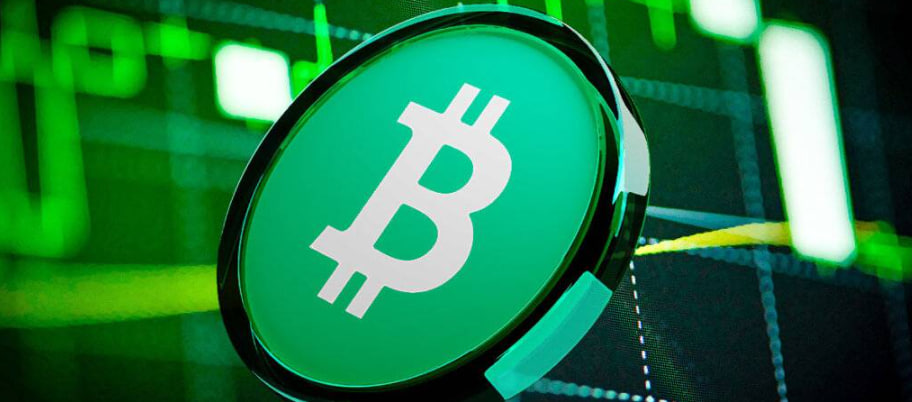
Supporters of the second method hard-forked Bitcoin to make Bitcoin Cash and increased the block size from 1MB to 8MB (later expanded to 32MB) to accommodate more transactions per block. This change aimed to reduce transaction fees and improve processing speeds, making Bitcoin Cash a more practical option for everyday payments.
Unlike Bitcoin, which is increasingly viewed as a long-term investment asset, Bitcoin Cash remains committed to Bitcoin’s original goal of being a fast, low-cost, peer-to-peer digital payment system. This distinction is a key factor in the Bitcoin vs Bitcoin Cash debate, as each network caters to different use cases and priorities.
2. Key Differences Between Bitcoin vs Bitcoin Cash
While Bitcoin vs Bitcoin Cash share a common ancestry, they have significant differences in their technical specifications, transaction capabilities, adoption rates, and security models. These differences dictate their suitability for various use cases and their appeal to different segments of the cryptocurrency community.
2.1. Block Size and Scalability
One of the primary differences between Bitcoin vs Bitcoin Cash is their approach to scalability. Bitcoin has a block size limit of 1MB, allowing it to process approximately 7 transactions per second (TPS). This limitation can lead to network congestion, particularly during peak usage, resulting in higher transaction fees and slower processing times.
Bitcoin Cash, on the other hand, started with an 8MB block size, later increasing it to 32MB. This expansion enables it to handle over 100 TPS, making it more suitable for fast and cost-effective transactions. However, critics argue that larger blocks require more storage and bandwidth, potentially reducing decentralization.

2.2. Transaction Speed & Fees
The difference in block sizes has a direct impact on transaction speed and fees. Due to limited block space and high demand, Bitcoin transactions can take anywhere from 10 minutes to several hours for confirmation. Transaction fees fluctuate but have averaged between $1 and $30, depending on network congestion.
In the other hand, with larger blocks, Bitcoin Cash transactions are processed more quickly, often within seconds. Fees are significantly lower, typically less than $0.01, making BCH a more viable option for microtransactions and everyday payments.
2.3. Adoption and Use Cases
When analyzing Bitcoin vs Bitcoin Cash in terms of adoption, Bitcoin leads by a large margin. It is widely accepted by businesses, institutional investors, and payment processors. Major companies like Microsoft, PayPal, and Overstock accept Bitcoin as a payment method, and it has also become an investment asset held by corporations and hedge funds.
Bitcoin Cash is accepted by some merchants and payment processors, but its adoption is much lower than Bitcoin. While it aims to be a widely used digital currency for transactions, it struggles with recognition and market penetration compared to Bitcoin.
2.4. Security and Decentralization
Security and decentralization are major factors in Bitcoin vs Bitcoin Cash. Bitcoin, with its smaller block size, has a higher number of full nodes securing the network. This decentralization strengthens Bitcoin’s security and resilience against attacks.
Bitcoin Cash’s larger block size makes it harder for individuals to run full nodes, which may lead to increased centralization. While its security remains strong, it is generally considered less secure than Bitcoin due to the lower hash rate supporting its network.
3. Bitcoin vs Bitcoin Cash: Which One is Better for Transactions?
When comparing Bitcoin vs Bitcoin Cash for everyday transactions, Bitcoin Cash appears to have an advantage due to its lower fees and faster transaction speeds. However, real-world usability depends on several factors.
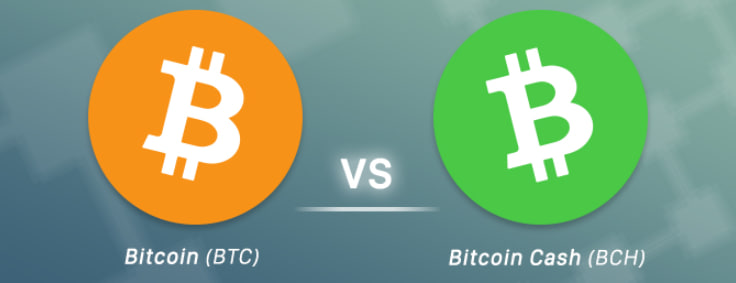
3.1. Performance on Daily Transactions
Bitcoin has higher fees and slower confirmation times, which makes it not ideal for daily transactions. The cost of sending small amounts can be prohibitive, and waiting for confirmations can be inconvenient. However, BTC is more appropriate for high-value transfers where speed is not critical
Bitcoin Cash, on the other hand, offers low fees and fast transaction speeds, making it well-suited for daily transactions. It allows users to make purchases and send money quickly and affordably.
3.2. Businesses Acceptance
As the most valuable cryptocurrency, Bitcoin is widely accepted by large corporations like PayPal, Tesla, Microsoft, and many e-commerce platforms. Its adoption is expected to grow further as governments introduce clearer legal regulations on cryptocurrencies.
When comparing the acceptance networks of Bitcoin vs Bitcoin Cash, BCH has a smaller adoption base but is steadily growing. Bitcoin Cash is now supported by various smaller businesses and online platforms, including BitPay and Purse.io.
>> Purchase Bitcoin Cash (BCH) now on FMCPAY exchange <<
4. Bitcoin vs Bitcoin Cash: Which Is a Better Investment?
There are many factors to consider before choosing between Bitcoin vs Bitcoin Cash as an investment. Bitcoin is viewed as a more established and secure investment, while Bitcoin Cash offers potential for growth as a medium of exchange.
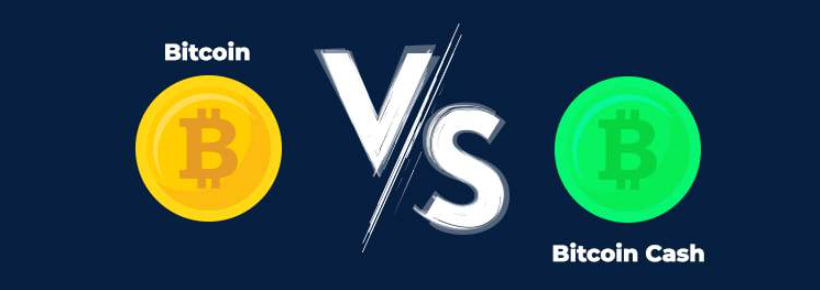
4.1. Market Cap and Liquidity Comparison
As of 2025, Bitcoin vs Bitcoin Cash shows a significant disparity in market capitalization. Bitcoin boasts a market cap exceeding $1.8 trillion, while Bitcoin Cash is valued at approximately $6.3 billion. This vast difference in market cap highlights Bitcoin’s dominant position in the market.
Due to its larger size and greater liquidity, Bitcoin is a preferred choice for investors, as it is easier to trade, and its market stability provides more confidence for long-term investments. In comparison, Bitcoin Cash’s smaller market cap and liquidity make it more susceptible to volatility, which may appeal to a different type of investor.
4.2. Historical Price Trends and Future Predictions
Historically, Bitcoin vs Bitcoin Cash has been a clear competition in terms of price appreciation. Bitcoin has consistently outperformed Bitcoin Cash, reaching an all-time high of over $109,000 in Jan 2025. In contrast, Bitcoin Cash peaked at around $4,300 in Dec 2017 but has struggled to regain significant value in recent years.
Experts predict that Bitcoin will likely continue to dominate the market, driven by its widespread adoption, institutional support, and role as a store of value. Meanwhile, Bitcoin Cash may remain a niche asset with limited upside potential, primarily used for daily transactions rather than long-term investment growth.
4.3. Institutional Adoption and Investor Confidence
Institutional adoption plays a crucial role in determining the investment potential of any asset. Bitcoin vs Bitcoin Cash illustrates this clearly, as BTC has received significant institutional backing from major companies like Tesla, MicroStrategy, and Square. This widespread institutional support has bolstered investor confidence in Bitcoin, making it a safer and more attractive investment option for large-scale investors.
On the other hand, Bitcoin Cash lacks similar institutional backing, which may limit its appeal among high-net-worth individuals and large financial institutions, ultimately making it a less favorable option for those looking for secure, institutional-grade investments.
>> Purchase Bitcoin (BTC) now on FMCPAY exchange <<
5. Future Outlook of Bitcoin Cash vs Bitcoin
The future of Bitcoin vs Bitcoin Cash is subject to much speculation. The differing roadmaps and community visions will likely shape their respective trajectories.
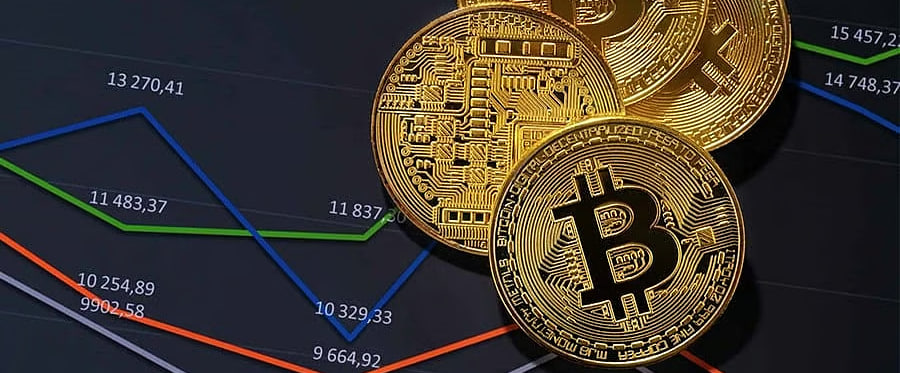
5.1. Potential Upgrades and Forks
The future of Bitcoin vs Bitcoin Cash could involve further upgrades and forks aimed at improving scalability and transaction efficiency. Bitcoin has already implemented SegWit and is actively working on the Lightning Network, which aims to address scalability issues without altering the core protocol. Still, these upgrades don’t fully address the growing demand for lower transaction fees and faster processing times.
On the other hand, Bitcoin Cash remains focused on expanding its block size to accommodate more transactions, which helps it compete with other cryptocurrencies in terms of transaction speed and cost-efficiency.
It’s worth noting that until now Bitcoin Cash has forked into three altcoins, while the original Bitcoin is going strong. As both cryptocurrencies continue to evolve, future upgrades and forks will likely play a significant role in determining the Bitcoin vs Bitcoin Cash battle for dominance.
5.2. Will Bitcoin Cash Ever Overtake Bitcoin in Usage?
Bitcoin vs Bitcoin Cash presents two different use cases, which is why whether BCH will ever overtake BTC in usage remains a topic of debate. In the long run, it’s unlikely that Bitcoin Cash will completely surpass Bitcoin, given Bitcoin’s established reputation as the leading cryptocurrency. Bitcoin benefits from brand recognition and wider adoption as “digital gold.”
However, Bitcoin Cash offers faster and cheaper transactions, making it better suited for peer-to-peer digital payments. For the remainder of 2025, DigitalCoinPrice predicts that the BCH token’s price could fluctuate between $296.53 and $730.69, with a likely yearly average of $698.19. Meanwhile, CoinCodex projects that BCH may trade within a price range of $303.46 to $635.40 in 2025.
5.3. Long-Term Viability of Bitcoin vs Bitcoin Cash
Bitcoin vs Bitcoin Cash has always been a contest between two very different visions of the future of cryptocurrency. Bitcoin’s security, institutional backing, and store of value status give it an edge in the long term. As global regulations and financial systems continue to evolve, Bitcoin is more likely to remain the dominant player in the crypto market.
While Bitcoin’s dominance may remain unchallenged in the long run, Bitcoin vs Bitcoin Cash is likely to remain an ongoing competition, with each serving a unique function within the broader cryptocurrency ecosystem. The future of BCH will depend on further adoption by businesses, improved scalability solutions, and greater institutional support.
Conclusion
When comparing Bitcoin vs Bitcoin Cash, it’s needed to recognize that each serves a different purpose in the crypto ecosystem. Bitcoin is the dominant cryptocurrency, valued for its security, adoption, and investment potential. In contrast, Bitcoin Cash offers faster and cheaper transactions, but it faces challenges with adoption and lacks strong institutional support.
For those looking for a long-term investment, Bitcoin is the clear winner. However, if the goal is everyday transactions with low fees, Bitcoin Cash is a viable alternative. Ultimately, the choice between Bitcoin vs Bitcoin Cash depends on individual priorities—whether it’s holding a secure store of value or making fast, cost-effective transactions.
Whether you’re in it for the long haul or just looking for a crypto payment solution, always research the latest market trends before investing. Follow FMCPAY for crypto insights, market updates, and expert analysis to stay informed and make smarter investment decisions.

